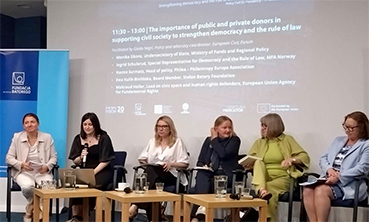The “EU Civil Presidency” event, held on June 17 at the Stefan Batory Foundation office in Warsaw, brought together professionals from across Europe and the host country to address the growing need to rebuild democratic trust in the current climate of geopolitical, social, and environmental challenges.
Climate change, economic precariousness, a war on the continent, and the shifting approaches of the new U.S. administration are among the challenges currently facing Europe—challenges that are eroding trust in democracy and institutions.
Adriana Porowska, Poland’s Minister for Civil Society, stated that it is important for civil society to understand the concepts of democracy, the rule of law, civil society itself, and civic space, so that people can identify with them. She criticized the fact that “across Europe, civil society—including philanthropy—is facing restrictive regulations and political pressure at both the national and EU levels.”
Ingrid Bellander Todino, representing the European Commission, spoke about the various initiatives launched by the Commission to strengthen civil society space, such as the new European Civil Society Strategy (built on three pillars: Protection, Support, and Engagement), the Civil Society Platform, and the so-called “Shield for Democracy.” She emphasized that public and private funding and support for civil society will be “more important than ever.”
Forum participants shared their concern that the EU is prioritizing defense and competitiveness while offering less support for democracy, the rule of law, fundamental rights, social issues, and the civil society actors.
Representing Philea—the European philanthropy and foundations forum—Hanna Surmatz participated in a panel on the role of the next EU budget and other public and private donors in supporting civil society to strengthen democracy and the rule of law. She stressed the need for an enabling environment for philanthropy and a more structured dialogue between public and private funders. Ingrid Shulerud, former Norwegian Ambassador to Belgium, suggested the EU could learn from the European Economic Area (EEA) grants, which allocate 10% of their funding to civil society.







